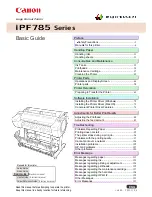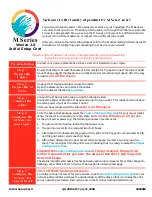
User Guide
81
Spec
ific
ation
s
SECTION 5 – FIRE-FIGHTING MEASURES
FLASH POINT (TCC): 56 degrees F
FLAMMABLE LIMITS (% BY VOLUME): LEL: NA UEL: NA
AUTOIGNITION TEMPERATURE degrees F (degrees C): NA
EXTINGUISHING MEDIA: Isopropyl-alcohol fires may be extinguished using
carbon dioxide, dry chemical or alcohol foam. Water may be used to cool
containers exposed to the fire.
UNUSUAL FIRE OR EXPLOSION HAZARDS: Isopropyl alcohol may release
vapors which may ignite at or above flash point.
NFPA RATING: HEALTH (1)
FLAMMABILITY (3)
REACTIVITY (0)
Formulation is classified as an OSHA Class IB Flammable Liquid
NA = Not Available
SECTION 6 – ACCIDENTAL RELEASE MEASURES
Since the isopropyl-alcohol solution is completely absorbed by the applicator
and the amount of isopropyl alcohol per applicator is small, the chance of a
significant spill occurring is small. In the event however, that a significant
amount of liquid is released, ventilate the area, especially low areas where
vapors may collect, and remove all sources of ignition. Cleanup personnel
need protection against liquid contact and vapor inhalation.
SECTION 7 – HANDLING AND STORAGE
Store in a clean, cool, ventilated area away from sources of ignition and
oxidizing agents. Handle and store in a manner suitable for an OSHA class IB
Flammable Liquid. Electrical services must meet applicable codes. Use
non-sparking tools.
SECTION 8 – EXPOSURE CONTROL – PERSONAL PROTECTION
Provide ventilation to maintain TLV. Use non-sparking tools. Avoid
inhalation of vapors, contact with eyes and repeated or prolonged contact with
skin. Do not take internally.
SECTION 9 – PHYSICAL AND CHEMICAL PROPERTIES
BOILING POINT (80 degrees C) (180 degrees F)
% VOLATILE BY VOLUME @ 25 degrees C: 100
VAPOR PRESSURE (mmHg @ 25 degrees C): 33
EVAPORATION RATE (BUTYL ACETATE-1) >1
VAPOR DENSITY (AIR = 1): <1
FORM: liquid
% SOLUBLE IN WATER @ 25 degrees C: 100
ODOR: alcohol
SPECIFIC GRAVITY (G/CC @ 25 degrees C): 0.79
APPEARANCE OF LIQUID: clear














































